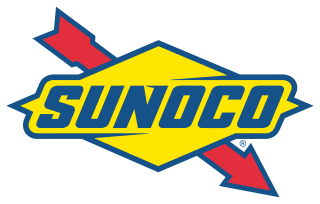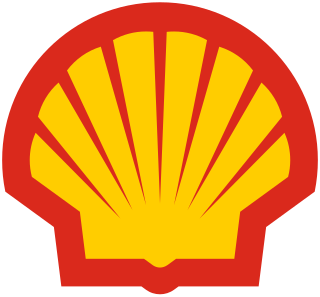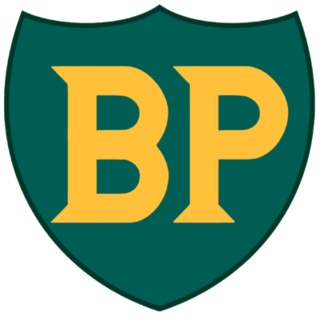
Amoco is a brand of fuel stations operating in the United States and owned by British conglomerate BP since 1998. The Amoco Corporation was an American chemical and oil company, founded by Standard Oil Company in 1889 around a refinery in Whiting, Indiana, and was officially the Standard Oil Company of Indiana until 1985. Originally part of the Standard Oil Company trust, it focused on producing gasoline for the new automobile market. In 1911, as part of the break-up of the Standard Oil trust, it became an independent corporation. Incorporated in Indiana, it was headquartered in Chicago, and formally adopted the name Amoco in 1985. Although the Amoco Corporation merged in 1998 into BP Amoco, the Amoco name was resurrected in 2017 as a brand that service station owners could choose to use when they purchased supplies from BP in selected areas of the United States.
ARCO is a brand of gasoline stations owned by Marathon Petroleum. BP, which formerly owned the brand, uses it in Northern California, Oregon and Washington, while Marathon has rights for the rest of the United States and Mexico.

Texas City is a city in Galveston County, Texas, United States. Located on the southwest shoreline of Galveston Bay, Texas City is a busy deepwater port on Texas's Gulf Coast, as well as a petroleum-refining and petrochemical-manufacturing center. The population was 51,898 at the 2020 census, making it the third-largest city in Galveston County, behind League City and Galveston. It is a part of the Houston metropolitan area. The city is notable as the site of a major explosion in 1947 that demolished the port and much of the city.

Sunoco LP is an American master limited partnership organized under Delaware state laws and headquartered in Dallas, Texas. Dating back to 1886, the company has transitioned from a vertically integrated energy company to a distributor of fuels. It was previously engaged in oil, natural gas exploration and production, refining, chemical manufacturing, and retail fuel sales, but divested these businesses. Sunoco is the largest independent distributor of fuels in the United States.

Valero Energy Corporation is an American-based downstream petroleum company mostly involved in manufacturing and marketing transportation fuels, other petrochemical products, and power. It is headquartered in San Antonio, Texas, United States. Throughout the United States and Canada, the company owns and operates 15 refineries, and one in Wales, with a combined throughput capacity of approximately 3 million barrels (480,000 m3) per day, 11 ethanol plants with a combined production capacity of 1.2 billion US gallons (4,500,000 m3) per year, and a 50-megawatt wind farm. A Fortune 500 company, before the 2013 spinoff of CST Brands, Valero was one of the United States' largest retail operators with approximately 6,800 retail and branded wholesale outlets in the United States, Canada, United Kingdom, Mexico and Peru under the Valero, Diamond Shamrock, Shamrock, Beacon, and Texaco brands. It is largest independent petroleum refiner and marketer in North America.

Tesoro Corporation, known briefly as Andeavor, was a Fortune 100 and a Fortune Global 500 company headquartered in San Antonio, Texas, with 2017 annual revenues of $35 billion, and over 14,000 employees worldwide. Based on 2017 revenue, the company ranked No. 90 in the 2018 Fortune 500 list of the largest United States corporations by total revenue.

Shell USA, Inc. is the United States-based wholly owned subsidiary of Shell plc, a UK-based transnational corporation "oil major" which is amongst the largest oil companies in the world. Approximately 18,000 Shell employees are based in the U.S. Its U.S. headquarters are in Houston, Texas. Shell USA, including its consolidated companies and its share in equity companies, is one of America's largest oil and natural gas producers, natural gas marketers, fuel marketers and petrochemical manufacturers.

Marathon Petroleum Corporation is an American petroleum refining, marketing, and transportation company headquartered in Findlay, Ohio. The company was a wholly owned subsidiary of Marathon Oil until a corporate spin-off in 2011.

BP Canada was a Canadian petroleum company and subsidiary of British Petroleum that existed between 1955 and 1992. The name refers to a group of companies that engaged in various segments of the petroleum industry lifecycle. BP entered the Canadian market in October 1953, when it purchased a 23 percent stake in the Triad Oil Company. In 1955, BP formed a Canadian subsidiary, based in Montreal, called BP Canada Limited. The company began acquiring retail stations in Ontario and Quebec and in 1957 started construction on a refinery in Montreal. By the end of the 1950s BP Canada was a fully-integrated operation. In 1964, it acquired from Cities Service the Oakville Refinery, and then expanded its operations significantly in 1971 when it acquired Supertest Petroleum.

Phillips Petroleum Company was an American oil company incorporated in 1917 that expanded into petroleum refining, marketing and transportation, natural gas gathering and the chemicals sectors. It was Phillips Petroleum that first found oil in the North Sea on December 23, 1969, at a position that was later named Ekofisk.

Singapore Petroleum Company Limited, in short SPC, is a Singaporean multinational oil and gas company. It is involved in the exploration and production of petroleum, refining, trading and petroleum product distribution.

The Texas City refinery explosion occurred on March 23, 2005, when a flammable hydrocarbon vapor cloud ignited and violently exploded at the isomerization process unit of the BP oil refinery in Texas City, Texas, killing 15 workers, injuring 180 others and severely damaging the refinery. All the fatalities were contractors working out of temporary buildings located close to the unit to support turnaround activities. Property loss was $200 million. When including costs of repairs, deferred production, fines, and settlements, the explosion is the world's costliest refinery accident.

Kochi Refinery Limited (KRL) is a crude oil refinery in the city of Kochi in Kerala, India. It is the largest public sector refinery in India with a production capacity of 15.5 million tonnes per year. Formerly known as Cochin Refineries Limited and later renamed as Kochi Refineries Limited, it was acquired by Bharat Petroleum Corporation Limited in the year 2006. The refinery is situated at Ambalamugal, around 12 km (7.5 mi) east of the city centre.

BP p.l.c. is a British multinational oil and gas company headquartered in London, England. It is one of the oil and gas "supermajors" and one of the world's largest companies measured by revenues and profits. It is a vertically integrated company operating in all areas of the oil and gas industry, including exploration and extraction, refining, distribution and marketing, power generation, and trading.

The Mandan Refinery is the largest oil refinery in North Dakota, located within the northeastern corner of the city limits of Mandan, ND just north off Exit 153 of Interstate 94. As of 2022 it has a capacity of 76,000 barrels (12,100 m3) per day. The facility is owned by Marathon Petroleum.
On February 1, 2015, United Steelworkers (USW) announced that "more than 5,200 USW oil workers at 11 refineries in California, Indiana, Kentucky, Ohio, Texas and Washington are on strike against the industry’s unfair labor practices". The list of charges alleged by NSW filed with the NLRB included: bad-faith bargaining over the companies’ refusal to negotiate over mandatory subjects, impeded bargaining for the companies’ undue delays in providing information, threatening workers if they join the ULP strike and others. As of March 3, 2015, about 6,550 workers were on strike at 15 plants, including 12 refineries with a fifth of U.S. capacity. It was the first time since 1982 that U.S. oil workers have walked off their jobs to protest working conditions. The National Oil Bargaining talks began in 1965 and are part of the U.S. oil industry's Pattern bargaining process.
Trainer Refinery is an oil refining facility located in Trainer, Pennsylvania. The facility is downstream from the Port of Chester and fifteen miles southwest of Philadelphia along the Delaware River. Stoney Creek is along its northern perimeter. The Trainer Refinery is owned by Monroe Energy, LLC, a subsidiary of Delta Air Lines. Monroe Energy acquired the facility in June 2012. Since that time, the refinery has focused on producing jet fuel, gasoline, diesel, and home heating oil.

Following the 1911 Supreme Court ruling that found Standard Oil was an illegal monopoly, the company was broken up into 34 different entities, divided primarily by region and activity. Many of these companies later became part of the Seven Sisters, which dominated global petroleum production in the 20th century, and became a majority of today's largest investor-owned oil companies, with most tracing their roots back to Standard Oil. Some descendants of Standard Oil were also given exclusive rights to the Standard Oil name.















